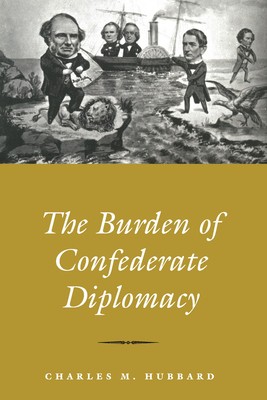
- We will send in 10–14 business days.
- Author: Charles M Hubbard
- Publisher: Univ Tennessee Press
- ISBN-10: 1572330929
- ISBN-13: 9781572330924
- Format: 15.5 x 23 x 1.9 cm, minkšti viršeliai
- Language: English
- SAVE -10% with code: EXTRA
Reviews
Description
"Thoroughly researched . . . [Hubbard's] interpretation is solid, well supported, and touches all of the major aspects of Confederate diplomacy."--American Historical Review
"As the first examination of the topic since King Cotton Diplomacy (1931), this work deserves widespread attention. Hubbard offers a convincingly bleak portrayal of the limited skills and myopic vision of Rebel diplomacy at home and abroad."--Virginia Magazine of History and Biography Of the many factors that contributed to the South's loss of the Civil War, one of the most decisive was the failure of Southern diplomacy. In this penetrating work, Charles M. Hubbard reassesses the diplomatic efforts made by the Confederacy in its struggle to become an independent nation. Hubbard focuses both on the Confederacy's attempts to negotiate a peaceful separation from the Union and Southern diplomats' increasingly desperate pursuit of state recognition from the major European powers.Drawing on a large body of sources, Hubbard offers an important reinterpretation of the problems facing Confederate diplomats. He demonstrates how the strategies and objectives of the South's diplomatic program--themselves often poorly conceived--were then placed in the hands of inexperienced envoys who were ill-equipped to succeed in their roles as negotiators.
The Author: Charles M. Hubbard is associate professor of history at Lincoln Memorial University and executive director of the Abraham Lincoln Memorial Museum in Harrogate, Tennessee.
EXTRA 10 % discount with code: EXTRA
The promotion ends in 21d.08:43:27
The discount code is valid when purchasing from 10 €. Discounts do not stack.
- Author: Charles M Hubbard
- Publisher: Univ Tennessee Press
- ISBN-10: 1572330929
- ISBN-13: 9781572330924
- Format: 15.5 x 23 x 1.9 cm, minkšti viršeliai
- Language: English English
"Thoroughly researched . . . [Hubbard's] interpretation is solid, well supported, and touches all of the major aspects of Confederate diplomacy."--American Historical Review
"As the first examination of the topic since King Cotton Diplomacy (1931), this work deserves widespread attention. Hubbard offers a convincingly bleak portrayal of the limited skills and myopic vision of Rebel diplomacy at home and abroad."--Virginia Magazine of History and Biography Of the many factors that contributed to the South's loss of the Civil War, one of the most decisive was the failure of Southern diplomacy. In this penetrating work, Charles M. Hubbard reassesses the diplomatic efforts made by the Confederacy in its struggle to become an independent nation. Hubbard focuses both on the Confederacy's attempts to negotiate a peaceful separation from the Union and Southern diplomats' increasingly desperate pursuit of state recognition from the major European powers.Drawing on a large body of sources, Hubbard offers an important reinterpretation of the problems facing Confederate diplomats. He demonstrates how the strategies and objectives of the South's diplomatic program--themselves often poorly conceived--were then placed in the hands of inexperienced envoys who were ill-equipped to succeed in their roles as negotiators.
The Author: Charles M. Hubbard is associate professor of history at Lincoln Memorial University and executive director of the Abraham Lincoln Memorial Museum in Harrogate, Tennessee.


Reviews